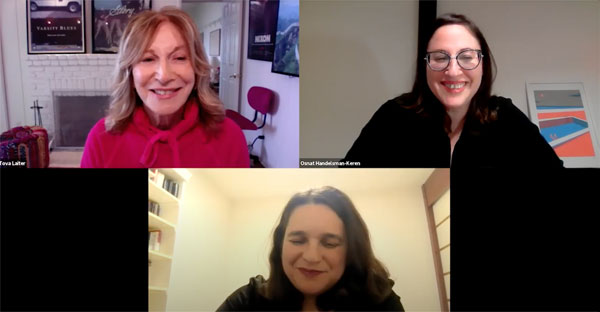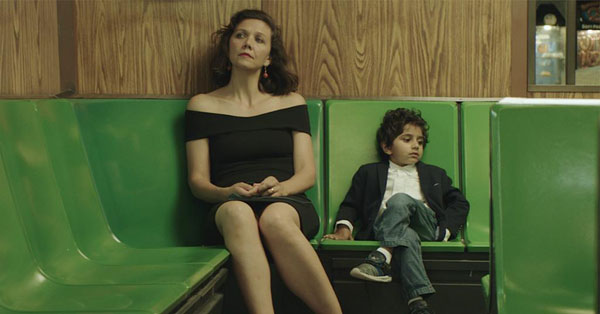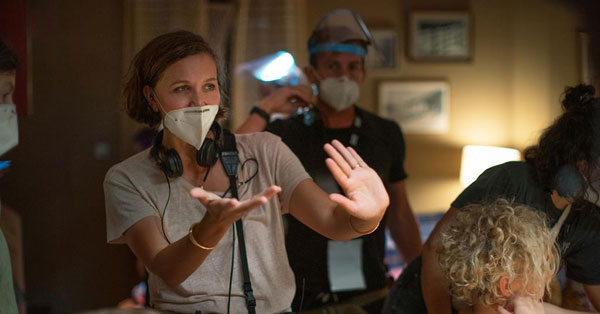New York Film Academy (NYFA) had the honor of hosting a live video Q&A with Osnat Handelsman-Keren and Talia Kleinhendler to discuss producing international films and The Lost Daughter with NYFA students and alumni. Tova Laiter, Director of the NYFA Q&A-List Series, curated and moderated the event.

Talia & Osnat are the producing team behind Pie Films, one of Israel’s most prolific and successful production companies. Pie Films produces multiple award-winning films, set up as international co-productions, which have premiered in Cannes, Venice, Telluride, Sundance, Berlin and Toronto. Recent Films include Maggie Gyllenhaal’s directorial debut The Lost Daughter starring Olivia Colman, Jessie Buckley, Dakota Johnson and Ed Harris. Venice IFF 2021 and Cannes 2021 Jury prize winner Ahed’s Knee by Nadav Lapid. They also produced Nadav Lapid’s film Synonyms, which won the Golden Bear at the Berlin Film Festival 2019. as well as, The Kindergarten Teacher, a remake from their Israeli film by the same name, starring Maggie Gyllenhaal and written and directed by Sara Colangelo. The film premiered at Sundance 2018 as part of the US dramatic competition, and won The Best Director award.

The two weren’t always a duo. Keren worked in Israel on the distribution side of films for nine years before she began to feel that “something was missing” and decided to take some time off. During this time, Kleinhendler was co-producing films with her own production company. It was during this hiatus that a mutual friend – who had been trying to connect the two “for years, with no agenda” – managed to get them together for lunch for what would be the beginning of their partnership.
--02-22-22clean.jpg)
How the duo came to meet and work with Maggie Gyllenhaal is another story about good lunch dates turned partnerships. Kleinhendler jokes, “it is important to have a budget for lunch.”
When Kleinhendler, Handelsman-Keren and Sara Colangelo got together to discuss possible actors to cast, they all wanted Maggie Gyllenhaal. Kleindhelnder says, “she’s an actress that, for years, all of us admired”. They sent Gyllenhaal the script and the previous Israeli movie through her agent and she fell in love. Gyllenhaal met with Colangelo in New York and after hitting it off, it was time for Handelsman-Keren and Kleinhendler to finally meet Gyllenhaal over lunch. The three had an “Incredible connection,” says Handelsman-Keren, “I don’t know how we came to just ask her if she ever thought about directing…she really is such an incredibly smart woman but more than anything she really is an artist…you saw the way she breaks down the script and thinks about all sorts of things that involve the film, it’s the way a filmmaker thinks”.
Responding to their question, after lunch, Gyllenhaal took them to a bookstore in the Lower East Side where she purchased for them copies of Days of Abandonment by Elena Ferrante. Prior to this, the two producers did not know of Ferrante’s work. This introduction “set the tone for what would follow”. While the three worked together on The Kindergarten Teacher, Handelsman-Keren and Kleinhendler revisited the question of directing. Gyllenhaal said she would want to direct a Ferrante adaptation.

However, adapting a Ferrante novel is almost as difficult as filming in the middle of a pandemic. Elena Ferrante is only the pen name of the beloved Neopolitan author. No one actually knows who Elena Ferrante is and she cannot be contacted directly. Handelsman-Keren and Kleinhendler, asked their network in Italy for leads on who might have the rights to the book they wanted to adapt. Handelsman-Keren sent email after email to the publisher, to no avail. It was July and the Italians were on vacation. Until “one day we just had enough,” says Handelsman-Keren. “[I] called the secretary and said, ‘I was with him on a call and got disconnected; he’s waiting to hear from me, can I just get his cell phone number?’ and somehow she gave it to me.” She called, introduced herself and his response was ‘Oh yes, I know, I know, I’ve gotten your thousand emails but we’re on holiday until September’. They didn’t speak until September 1st and by then the rights to the book they wanted weren’t unavailable. The publisher recommended The Lost Daughter. The three took immediate interest in the book and began negotiations. However, Handelsman-Keren told us, “in order for the publisher to give us the rights to the book, Elena herself has to agree. So, Maggie wrote a beautiful, beautiful letter to Elena Ferrante” explaining why she wanted the book and what she wanted to do with it. Elena agreed to give Gyllenhaal the rights to the film. There was one caveat, the project could only be made if Gyllenhaal directed it. It was non-negotiable.
The road to The Lost Daughter is a lesson in persistence and artistic collaboration.
Laiter closed the conversation by discussing the movie’s appeal to women as it explores the taboo of depicting layered, ambivalent mothers in film. This subject, as well as the film’s ambivalent ending, are at the heart of many groups’ discussion after they see the movie.
New York Film Academy would like to thank Osnat Handelsman-Keren and Talia Kleinhendler for sharing their time and experience with NYFA students and alumni.
To hear the full conversation, watch the video, below: